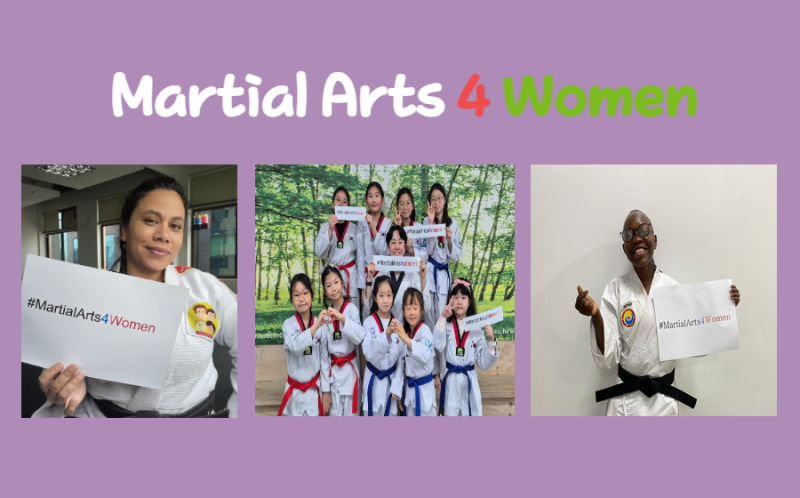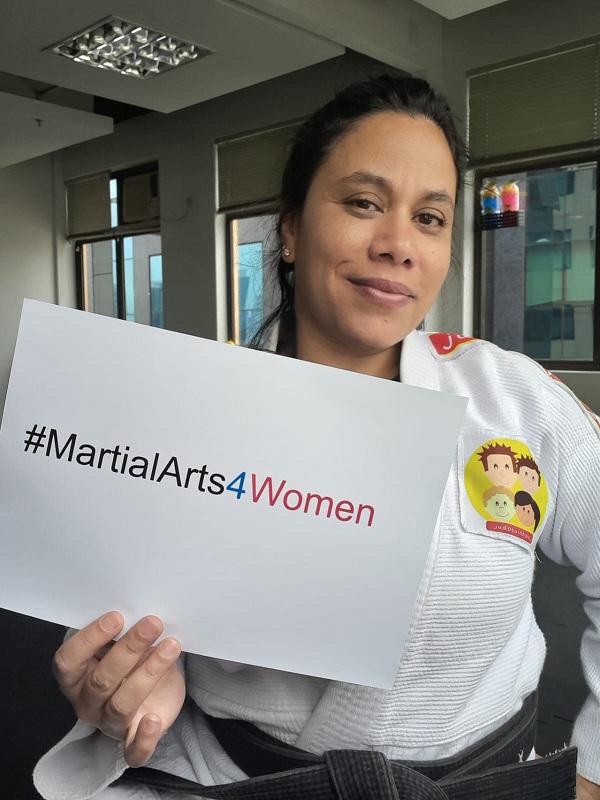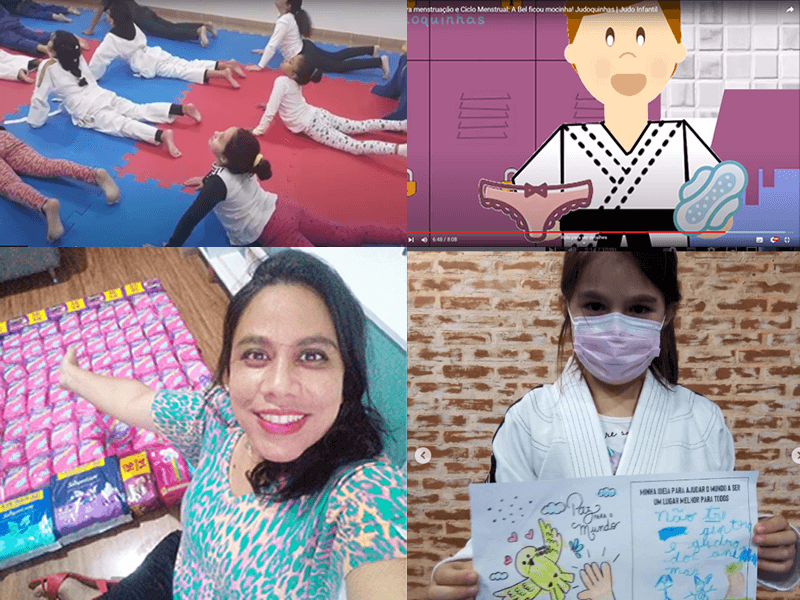Subscribe
Subscribe to our quarterly email newsletter 「ICM News」 to receive recent news about ICM, diverse writings by experts and youth, and relevant information.
Title [ICM's Pick] [International Women's Day(8th of March, 2024)] Interviews with Female Martial Arts Instructors

Interviews with Female Martial Arts Instructors
★ Patrícia Amaral / Founder of Judoquinhas, Judo
Q1. Please briefly introduce yourself I’m Patrícia Amaral, Brazilian, black belt, judo instructor and founder of “Judoquinhas”, a judo program specialized in child development. At Judoquinhas, I seek to use judo as a tool to contribute to the realization of the Sustainable Development Goals (UNESCO, 2015), including gender equality. If Brazil is one of the worst countries in South America to be a girl (The Save the Children Fund, 2016), then, for me, it is essential that Judoquinhas' actions and initiatives strengthen the sense of belonging and empowerment of girls who practice judo. I believe that we, women, are fighters by nature. The history of Brazilian girls and women is full of struggles to gain space to study, work, vote and play sports. Judo mats, in turn, are just another space that we can not only access, but also shape to meet our needs and expectations and then create possibilities to realize our full potential as girls and women. The women who preceded us fought to open the doors to access the practice of martial arts. While this is a critical first step, I believe equality is not just about access to practice; equality is about achieving the potential results of martial arts practice. No one will solve this challenge for us, women, if not, ourselves. And I will not settle for the data showing that it will take centuries to achieve full gender equality (UN Women, 2022). Over time, Judoquinhas has achieved a leadership position in the development of judo methods for children and, through Judoquinhas, I have dedicated efforts with practical actions and initiatives to show girls that our place is wherever we want, inside and outside the mats, and that even children are capable of realizing their full potential to shape the world. Q2. What do you think are the benefits of doing martial arts for girls and women? I think of judo as a tool whose benefits depend on how it is used. I do not assume that the practice of judo, by itself, will promote benefits regardless of how classes are conducted, automatically or invariably. Through Judoquinhas, what I most want is the transfer of the learning obtained on the mats to off the mats, in daily life. For me, this transfer depends on intentionality in lesson planning. And I believe that I must be intentional about leading classes with the unique characteristics of women in mind, as well as raising awareness about issues related to gender equality during classes. Respecting these conditions makes it possible for girls and women to strengthen their minds and bodies and enable us to be agents of change towards a better world for everyone in the present and future. Through judo, we can inspire girls and women to take ownership of our place, support each other to excel in our endeavors, encourage actions of social impact, and raise awareness about gender equality issues. In the end, we want accomplished and successful girls and women acting in society as protagonists. However, without these conditions, we will not be able to reach our full potential, and there will be no transfer, as we will tend to reinforce sociocultural barriers on and off the mat that maintain insidious forms of discrimination and gender inequality. Q3. Please tell us about your
programmes that target women/girls
Q4. What is the environment required for girls and women practicing martial arts? I believe that environments are still not sufficiently well prepared for girls and women. We have reached a point where we have more access, however, it is access to education systems and environments mostly designed for men. It is not just about the physical aspect and logistical resources of the environment, but also about the culture. Most of these environments do not always convey a sense of safety, acceptance and belonging to girls and women. We want to train in environments that explicitly demonstrate that martial arts is where we belong too. But often, girls and women either adapt to a context not prepared for them in order to feel respected, taken seriously and belong, or they are dissuaded from practicing martial arts. This is why we, women who practice martial arts, must have a clear position regarding our role in the development of gender equality. We must spread women's empowerment and protagonism in the context of martial arts, creating strategies, designing educational and social environments more conducive to gender equality and being role models to inspire girls and women to fight for their dreams, know that they have a choice and thrive in the spaces they want. Q5. What should martial arts instructors know/possess when teaching martial arts especially for women and girls? We, women martial arts instructors, unfortunately, often have to deal with the undervaluation of our skills and knowledge in martial arts, due to the assumption that a male instructor would be more competent than a female instructor. We have to deal with negative stereotypes and inappropriate comments about women as leaders and resistance to women's leadership style, as well as pay discrepancies. Male instructors have long been comfortable in martial arts spaces, which were dominated by them; now they need to update themselves and acquire scientific, pedagogical and didactic preparation to deal with a new and growing audience of girls and women. A growing body of research examining the effects of exercise on women has highlighted the need to create training programs and environments conducive to the development of girls and women, as training designed for men tends to limit and may not improve women's performance. Today, women's struggle must be to seek to optimize their potential considering their gender specificity. Due to scientific advances, we can have a greater understanding of women's particularities, including not only physical issues, but also socio-cultural ones. Martial arts instructors, including female instructors themselves, as ethical and authority figures, must ensure the mental and physical integrity of practicing girls and women; be included in the development of policies and determine conduct that will or will not be accepted. Importantly, the adoption of a permissive stance by instructors in the face of injustice, prejudice, discrimination and harassment situations in which women are directly affected is unacceptable. The teaching methodology also needs to be reviewed, from the exercises to the language of feedback, valuing the students' commitment according to their challenges, skills and uniqueness. Women martial arts instructors should also be role models of successful and accomplished people so that they can serve as role models and inspiration for the next generations of girls. Q6. Tell us about your future plan. My family has been dedicated to the design and implementation of a human development framework through martial arts, which has shown effectiveness in working with children with different demands and needs. However, my family and I want to dedicate ourselves more to research to delve deeper into the specificities of practicing girls and women and extract practical implications and applications for class planning. I want to translate the findings from this research into practical interventions to contribute to training environments that support gender equity and then share them with the martial arts community. ★ Eun-ji LEE / Owner and head of Taekwon Forest (the Taekwondo gym exclusively for girls), Taekwondo Q1. Please briefly introduce yourself. My name is Eun-ji Lee and I am an instructor at Taekwon Forest, a Taekwondo gym exclusively for girls only. I am Korea’s the very first expert on teaching Taekwondo for girls. Q2. What do you think are the benefits of doing martial arts for girls and women? There are of course so many benefits, but if I had to pick one, it would definitely be improvement of physical self-efficacy. Some girls and women have a tendency to struggle in the process of achieving their goals or solving the problems that may arise in the course of achieving such goals. What I learned after teaching and researching Taekwondo for the past ten years is that the girls who practiced Taekwondo have stronger physical self-efficacy and thus have stronger believes in themselves, and even though they struggle and panic sometimes, they don’t lose control over what's going around them and seek what to do for the next step, rather than stay frustrated for too long. I strongly believe that girls or women who experienced martial arts will have stronger physical self-efficacy which will benefit them both with their social and personal lives. Q3. What is the environment required for girls and women practicing martial arts? Personally I think the ambience of most of the current martial art gyms out there are optimized for the people such as instructors or enthusiasts who have been practicing for a very long time. Perhaps that’s why they look too heavy and it’s not easy to access or approach. Female are more sensitive in terms of what they see, hear and smell than male. I’m not saying that the gyms should be pretty and fancy, all bubbly. Just by giving some small changes, such as adopting warm and bright colors and fresh and clean smell, instead of dark colors and sweaty smell, you can create a welcoming vibe for girls and women to try and experience martial arts. Q4. What should martial arts instructors know or possess when teaching martial arts especially for women and girls? To teach girls, you need to have knowledge about the physical and emotional changes they go through during their puberty. Boys don’t go through big changes, whereas girls start to develop their breasts and start menstruation, which leads to physical and emotional changes. Also to interact with girls, it is important to show a mutual respect rather than being coercive or commanding. Lastly, since it is true that martial arts including Taekwondo were first made for men, there are some movements difficult for women to perform. That is why instructors are recommended to learn skills tailored to the physical condition of girls or women. Q5. Tell us about your future plan. I have been operating Taekwondo gym exclusively for girls, teaching them, and researching for the past ten years. When I first told my plan about starting a Taekwondo gym exclusively for girls, everyone was against this idea, but now, everyone tells me I was right. My goal is to have girls across the country to practice Taekwondo as much as boys. To make this happen, we need to educate and train instructors so that they have full understanding about the environment, knowledge, attitude, behavior, skills required to teach girls. That is why I would like to start educating and training instructors. Helping these instructors to find decent jobs and continue their life is my future plan. ★Lona Abiero / Co-Founder and instructor at Kaizen Martial arts Kenya, Karate
Q1. Please briefly introduce yourself. My name is Lona Abiero and I am a female martial arts instructor in Nairobi, Kenya. I am the Co-Founder and instructor at Kaizen Martial arts Kenya,Kaizen ,which is based in Mukuru Kwa Njenga Slums, in Embakasi,Nairobi. My journey in martial arts started in 2015 in a city called Kisumu. I practice Tong-il Moo-do,which is a unified martial arts style from South Korea. I have various accolades to my name as an athlete, majorly, 2019 Gold medalist Chungju WMC and four times African champion among other local,regional and national championships. Martial arts has freed me of the fears and concerns that surround me as a woman. Q2. What do you think are the benefits of doing martial arts for girls and women? Apart from building social skills that comes from networking with like minded individuals,martial arts also empowers us with practical self defense skills which enables us to defend ourselves in various situations. This boosts our confidence and self esteem. Women are more likely to be attacked or abducted than men. According to Africa Data Hub,At least 500 women and girls have been murdered in Kenya since 2016,femicide cases have been on the rise and i believe that if we enrolled all our girls in martial arts classes, and taught our boys and men to respect and value women,we will save a lot of women and girls. Martial arts fosters a sense of empowerment,boosts self confidence and makes women stand out as more purposeful, ambitious and determined as they break through stereotypes and societal barriers. Q3. What is the environment required for girls and women practicing martial arts? I think the systems and environment in urban centers and major towns and cities are equipped to handle women practicing martial arts. In fact, most open minded men would encourage their daughters, sisters and even wives to join martial arts. As femicide, gender based violence and Intimate partnership violence rise, women are seeing the need to learn a few self-defense skills. People living in the rural areas in Kenya however find it as a taboo to allow women and girls to learn martial arts. These are areas which still lack electricity, no internet connections,practice FGM (Female Genital Mutilation) and forced early child marriages. These communities don't have any access to online research materials hence no information on the benefits of martial arts. Their major focus on girls is to raise them well and prepare them for early marriages when they reach thirteen years. At thirteen years old, girls should be in school and engaging in school work activities like learning self-defense skills, and not being taught how to behave in front of their husband and raise children. Q4. What should martial arts instructors know/possess when teaching martial arts especially for women and girls? A martial arts instructor dealing with young girls must be knowledgeable about the female anatomy and the reproductive system once they start hitting puberty. A lot of changes occur to girls in adolescence and this is always a very crucial age. A good instructor must know how to balance training and pep talks in between the sessions. Martial arts instructors must have a positive attitude. This involves encouraging the girls and women in their class to assure them that they can do martial arts and excel well in it.In a class that has both male and females ,coming up with motivation strategies like, best female student of the month, or most disciplined is also a good way to motivate young girls and women to continue learning martial arts. Q5. Tell us about your future plan Apart from offering affordable instructor courses for women,organizing female empowerment talks is another way to assure young girls and women that martial arts is for life . Most women grew up being shouted at when they did not do the house chores well. Most of these statements were directed to them being slow or weak or stupid, especially if academics was involved. We grow up with such deeply ingrained statements and coaching players in a fight involves being bold and standing up for what is right even when your opponent is a male coach. Women shy away from occupying spaces where men are involved in. By holding women empowerment talks, I believe that it will make women believe in themselves more. In a bid to strengthen ties within martial arts federations in Kenya, this year we are going to have a martial arts sports festival for women and girls only to happen in July from 19th to 21st. This event will be happening annually in July, the first one being this year, and its aimed at promoting martial arts as a sport and building strong bonds between female martial arts athletes in martial arts federations in Kenya. ※ Views in this writing are the author's own |



















